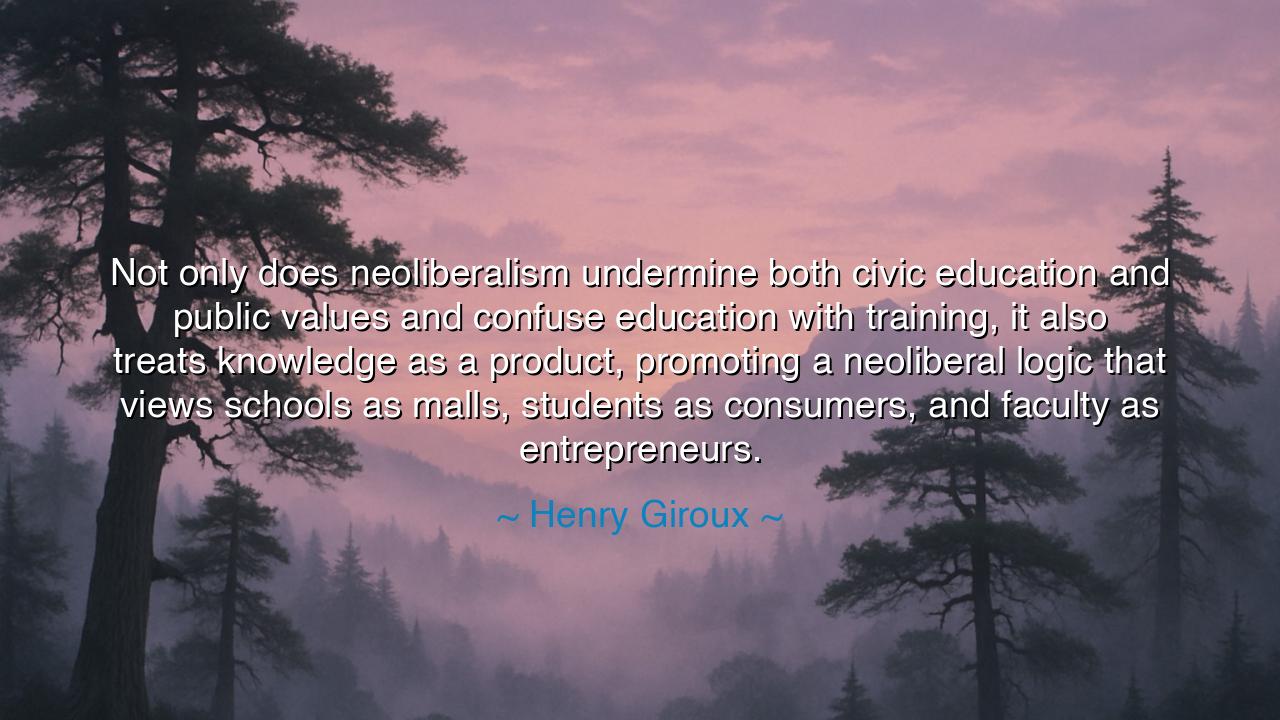
Not only does neoliberalism undermine both civic education and
Not only does neoliberalism undermine both civic education and public values and confuse education with training, it also treats knowledge as a product, promoting a neoliberal logic that views schools as malls, students as consumers, and faculty as entrepreneurs.






“Not only does neoliberalism undermine both civic education and public values and confuse education with training, it also treats knowledge as a product, promoting a neoliberal logic that views schools as malls, students as consumers, and faculty as entrepreneurs.” — Henry Giroux
In these thunderous and mournful words, Henry Giroux, the philosopher, critic, and defender of democracy, speaks as a prophet of our age — crying out against the slow and silent corruption of education. He warns that under the cold and glittering hand of neoliberalism, the sacred art of learning has been transformed into an industry, and the classroom, once a temple of thought, has become a marketplace. The teacher, once a guide of the soul, is now a vendor of skills. The student, once a seeker of truth, is now a consumer of credentials. In this tragic inversion, Giroux sees not merely a change of method, but a crisis of meaning — for when knowledge is treated as a product, truth itself becomes a commodity, bought, sold, and forgotten.
The origin of this quote lies in Giroux’s long struggle against the dominance of neoliberal thought in modern life. A scholar of critical pedagogy and a disciple of Paulo Freire’s belief that education should awaken consciousness, Giroux has spent decades examining how economics has devoured ethics, and how the language of profit has replaced the language of purpose. In the late 20th and early 21st centuries, as governments privatized public institutions and corporations extended their influence into universities, he saw a new order rising — one where schools mirrored shopping centers, where value was measured not in wisdom or civic virtue, but in market efficiency. His words are therefore both diagnosis and warning: that when education forgets its moral mission, society forgets its soul.
The ancients, had they lived in this time, would have shuddered at such a transformation. In the days of Plato, education was the very breath of the polis — the means by which citizens learned not merely to labor, but to live rightly. The philosopher-kings of his Republic were to be formed through study, reflection, and discipline, that they might govern not for gain but for the good of all. Yet Giroux reminds us that in our age, this noble vision has been inverted. Where Plato saw education as the path to wisdom, neoliberalism sees it as a tool for productivity. Where Aristotle spoke of virtue as the end of learning, modern systems speak of employability. Thus, what was once the awakening of reason has been reduced to the training of function — the shaping of workers, not citizens.
Consider the tale of Socrates, the gadfly of Athens, who chose death rather than abandon his calling to question, to challenge, to seek truth beyond convention. In the modern world Giroux describes, there is little room for such souls. The Socratic teacher, who dares to disturb complacency, is cast aside in favor of measurable outcomes and corporate partnerships. The university that once nurtured philosophers now pursues profit, and the student who once pondered justice now studies branding and market analytics. The spirit of inquiry, that divine spark which has carried humanity through centuries of darkness, flickers under the fluorescent glow of the marketplace.
Yet Giroux’s lament is not without hope. Beneath his critique burns the conviction that education can still be redeemed. He calls upon teachers, students, and citizens alike to reclaim the classroom as a public space of resistance — a place where knowledge serves democracy, not domination. For he knows that when education is free, so too is the mind; but when it is enslaved to market logic, even the freest nation becomes a prison of the spirit. True learning, he teaches, is an act of courage — the refusal to accept the world as it is, and the faith to imagine it as it could be.
His warning also reaches beyond education, to the very heart of civilization. For when a society treats all things — even wisdom — as commodities, it unravels its moral fabric. The market may measure profit, but it cannot measure purpose; it may create wealth, but not meaning. A nation that forgets this truth risks raising a generation of technicians who can build machines, but not question their use; analysts who can measure, but not judge; and citizens who can buy, but no longer believe. Thus, Giroux’s words echo like a trumpet in a sleeping land: education must not be sold, for it is the lifeblood of freedom.
Let this, then, be the lesson drawn from his wisdom: that knowledge is not a product, but a covenant — a bond between generations, a sacred trust between teacher and learner. To preserve it, we must resist the temptation to turn schools into markets and students into statistics. Parents, demand not merely skills for your children, but souls that can think and care. Teachers, remember that every lesson you teach either serves freedom or servitude. Students, seek not credentials but understanding, for it is only through thought that one becomes truly human.
So, O listener, guard your mind from the merchants of conformity. Defend the classroom as you would defend your home. For as Henry Giroux reminds us, the true battle of our time is not between left and right, but between education and indoctrination, between citizenship and consumerism, between truth and transaction. And if we would preserve the flame of wisdom for those who come after us, we must remember — and live by — this sacred creed: education is not for sale, because the soul is not for sale.






AAdministratorAdministrator
Welcome, honored guests. Please leave a comment, we will respond soon